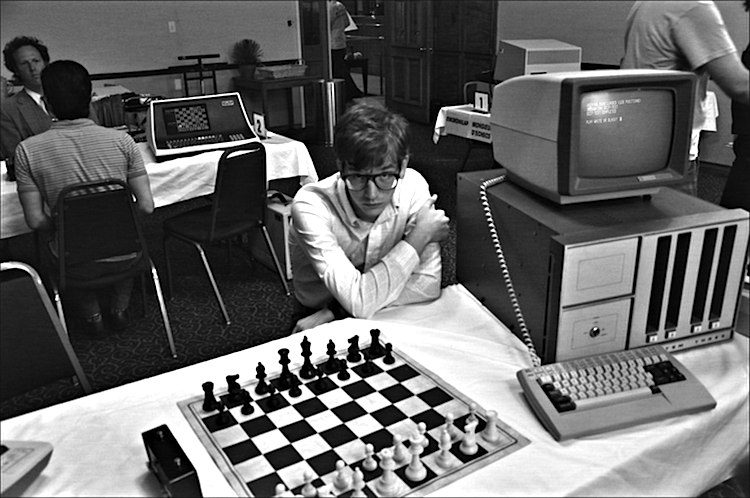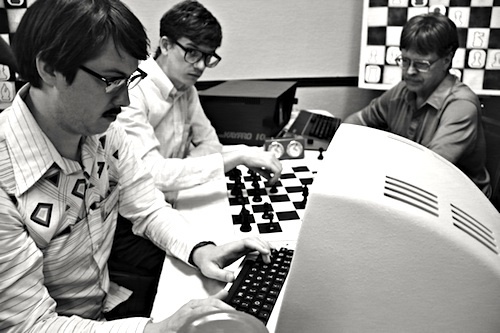
[Editor’s Note: the post below appears today at The Huffington Post.]
By Jason Apuzzo. Computers need to be put in their place. They really do.
That’s why I’ve been looking forward to the DVD release this week of Andrew Bujalski’s cult Sundance hit Computer Chess. Computer Chess finally spills the beans about where these little monsters came from in the first place.
Every time I pick up a newspaper these days – I’m one of the twelve people left who still read physical newspapers – I read about how computers are spying on us, destroying jobs, or infuriating health insurance customers. Like a hungry Rottweiler off its leash, computers are getting out of control and tearing up the neighborhood.
If you believe what you read, computers are also in the process of wrecking the book publishing and music industries, eliminating celluloid photography – and just this week computers claimed their latest victim, one near and dear to my heart: the local video store, as Blockbuster finally succumbed to laptops, smartphones and tablets as the preferred ways of renting all those movies you couldn’t afford to see (or were too embarrassed to see) when they were in theaters.

No more video stores – who would’ve believed it, even just ten years ago? That means no more pimply teenagers to recommend midnight horror movies to me (“Sir, I definitely recommend C.H.U.D. over TerrorVision“), no more aimless browsing or listening to neighbors argue over which Steven Seagal movie to rent, no more cheap licorice sticks at the checkout counter.
I never thought I’d miss those things so much – but suddenly I do. And it’s all because of our ‘friend’ the computer. Computers are becoming like the Yankees during the ’90s: gobbling up everybody else’s talent, then telling us how good it is for baseball.
The propaganda over the wonders that computers supposedly bring to our lives is getting out of hand. In the very least, it’s out of proportion to the destruction computers are simultaneously causing – that ‘disruptive’ effect Silicon Valley gurus salivate over, like vampires at a blood drive.
So as Twitter – the company currently reducing our public discourse to snarky, 140-character outbursts – celebrates its gaudy IPO right now, I’d like to recommend a new movie out on DVD this week that casts digital technology in a very different light: Computer Chess.
You probably haven’t heard of Computer Chess. After all, it has no stars in it. Neither Disney nor Sony are building spin-off franchises around its characters. Chris Hemsworth doesn’t swing a hammer in the film, and Kate Upton wasn’t invited to the premiere (although it would’ve been funny if she was).
What Computer Chess has going for it, though, is that it tells the unvarnished, gawky truth about the early days of this public menace we’ve come to know as the ‘computer.’
Actually, Computer Chess isn’t all that obscure a film. Written and directed by mumblecore auteur Andrew Bujalski, the film debuted to critical acclaim earlier this year at Sundance (where it won the Alfred P. Sloan Prize), where I had the pleasure of seeing the funky little movie in a packed house with an appreciative crowd. It was a total hoot, especially for people like me who remember how uncool computers used to be before Steve Jobs arrived on the scene. In fact, you arguably can’t appreciate Jobs’ legacy properly unless you’ve seen Computer Chess – and witnessed what a clunky, nerdy, socially maladroit computer world Jobs inherited.
Computer Chess is set around 1980, in a shabby suburban motel that serves as the film’s entire setting over the course of one weekend. The aristocracy of the computer science world – the geek gods of Cal Tech, MIT, Bell Labs and elsewhere – have gathered for their annual computer chess tournament, with the winning machine getting the chance to face off against the pompous tournament host, who has never yet lost a game to a computer.
So it’s game on, as Apple IIs and Tandy TRS-80s – and their nerd jockeys – take each other on for all the marbles.
The film follows the impossibly awkward programmers as they compete with each other for the (slightly dubious) title, haul blocky computer mainframes around on push-carts, debate the future of computers in late-night bull sessions, and make cringe-inducing attempts at romance and/or sexual conquest with the tournament’s lone female competitor, a hopelessly bespectacled programmer named Shelly. The programmers also have a few droll encounters with a New Age group that shares the motel with them, who try to open up the nerdy programmers’ repressed emotional lives.
Good luck with that.
The performances Bujalski gets out of his mostly non-professional cast are uniformly natural and believable – with special kudos going out to Patrick Riester and Wiley Wiggins as the no-nonsense leads, Myles Paige as the egomaniac/would-be lothario ‘Michael Papageorge,’ and Robin Schwartz as the sweet, ungainly female programmer.
Indeed, Bujalski’s strategy of keeping things real (several cast members are actually programmers themselves) is the best thing Computer Chess has going for it. It’s easy to see how this film could’ve been botched by importing a Michael Cera or Jonah Hill into the mix with their pre-packaged nerd schtick. Computer Chess is too austere and genuinely indie for such Hollywoodisms – to the point that the movie was actually shot in low-res, black-and-white 4:3 analog video using a Sony AVC-3260 camera, dating from the late 1960s.
Bujalski clearly intends Computer Chess to feel like a ‘found object’ of the era – and the film does seem incredibly authentic as a depiction of early-80s geek culture.
The special kick of watching Computer Chess, though, is knowing how the awkward misfits depicted in the film – and the big, blocky, semi-functional machines they cart around – will someday conquer the world. Today’s gods of Silicon Valley (who are apparently getting pretty full of themselves these days) – the slick young guys in hoodies who debut their stock offerings with multi-billion dollar valuations, or who get played by Jesse Eisenberg or Justin Timberlake in the movies – are of course no longer the introverted weenies of yesteryear, as depicted in Bujalski’s film. Today’s techies are more likely to drive Porsche 918 Spyder-hybrids, date swimsuit models, or eat granola parfait at Palo Alto’s University Cafe.
What a difference thirty years makes.

Computer Chess is probably not the kind of movie these newer guys – and they’re still mostly guys (with all due respect to Sheryl Sandberg) – want to watch, because it doesn’t suit their current self-image. Computer Chess is like that embarrassing family album from the ’70s you keep in the attic, filled with horrid images of bad hair, braces and bell-bottom jeans – where everybody looks like they just stepped off the set of The Hardy Boys. It’s the kind of thing your relatives pull out during the holidays to keep you humble.
And this is actually why Silicon Valley’s geek aristocracy – and you know who you are – should embrace this film, because it does something vital: it humanizes them, at a time when a lot of us feel that what they’re doing to our society is, well, inhuman. Reading about the NSA and Healthcare.gov these days is depressing enough, but it’s even worse after years of reading about how companies like Google and Facebook have been undermining our basic sense of privacy, which is the delicate foundation of our freedom.
By the way, Computer Chess actually hints – in a sly, fun way – that the Cal Tech team’s fictional TSAR chess program might be the forerunner of dystopian supermachines of the future, like Skynet from the Terminator films. But the movie is pretty gentle and non-conspiratorial about these things. It could get much worse.
For example, Computer Chess could’ve more been more hard-edged, like Panos Cosmatos’ dystopian cult thriller Beyond the Black Rainbow, released here in the U.S. in 2012. Similarly set in the early 1980s, Black Rainbow depicts a young woman’s escape from a controlling, futuristic New Age research institute. The film’s high-tech ‘Arboria Institute’ – led by a psychotic, permanently disfigured scientist – harbors pretentions of harnessing technology in the achievement of higher spirituality. (By the way, the ‘Arboria Institute’ could easily have been the forerunner to the sinister, New Agey internet company ‘The Circle’ from Dave Eggers’ new novel of the same name.) Black Rainbow‘s Dr. Barry Nyle – along with his mentor, Dr. Mercurio Arboria – represents the dark side of the early 80s tech and self-actualization gurus depicted comedically in Computer Chess.
Of course, even Black Rainbow doesn’t compare to a film recently unearthed by Criterion: Rainer Werner Fassbinder’s 1973 sci-fi classic World on a Wire, which originally aired on German television as a two-part miniseries. In World on a Wire (based on American author Daniel F. Galouye’s novel Simulacron-3), an ‘Institute for Cybernetics and Future Research’ develops a computer simulation program featuring an artificial world – based on the real one – with over 9,000 avatars living as human beings, unaware that their world is only a simulation subject to manipulation. The purpose of the simulation? Advanced market research, of course. Things get dicey when the movie’s hero, Dr. Fred Stiller (actor Klaus Löwitsch), begins to suspect that this simulation may actually have multiple layers – and that he himself might be one such avatar.
Such dark visions suggest the will-to-power, the urge to control and manipulate, that many people now associate – with good reason – with a fully computerized society (what Neil Postman back in 1992 called a ‘technopoly‘). Whether that society is controlled by unseen government bureaucracies or huge and indifferent corporations hardly seems to matter anymore.
So the honeymoon is now over. Computers just aren’t that cool any more – mainly because of all the precious things in our lives that they’re destroying. That’s why a lot of us are now looking at the fine print when we buy in to the latest gadget or app, as we ask ourselves this basic question: as shiny and empowering as this new piece of digital technology is, what is it going to destroy that I don’t know about?
All of this stuff seemed a lot more innocent back in 1980, when Computer Chess is set. Of course, it’s worth pointing out that Computer Chess is basically about the race to create a machine that can outperform and (thereby replace) a human being. Back in 1980, that premise just seemed a lot funnier and more charming than it does right now.
Right now computers just don’t know their place.
Posted on November 8th, 2013 at 3:12pm.
A delightful article Jason. It captures some of the amazing, annoying, dangerous, fun, yet practical aspects of computers. It has been fascinating to see not only how computers have evolved and changed over the last thirty or so years but also how many different instruments in which they can now be accessed have appeared. While so much of their recent evolution has been related to the development of the Internet, it would have been difficult thirty years ago to believe the state of computer technology today. Nice to have a film which makes us think about the early stages of computer use and science because so many of the young people adept with computers and the Internet now did not live through this evolution in their lifetime.
One of my favorite commentators on computers was Andy Rooney. Are you familiar with his rant about them on CBS’s “Sixty Minutes”? He compares the computer with the typewriter he used for fifty years and made the following comment (among others):
“Computers aren’t nice to us. My typewriter never threatened me with a prison sentence by saying I have performed an illegal operation.”
Isn’t it scary when that “illegal operation” message appears on your computer? I was happy to see Rooney commenting on that.
I like another quotation as well:
“When I want to write something, the computer demands a password. In all the years I wrote on my typewriter, it never asked for a password, and no one ever stole anything I wrote either.”
Ah yes, computers and the Internet do make life complicated. So many passwords to remember as you work on your office computer or sign up for one Website or another. Now we are learning how careful we have to be about what we write because our messages now appear to be available to a much larger audience than we could ever have imagined.
Meant to add the following to my comment last night but was distracted by a phone call: Andy Rooney probably also felt that “computers need to be put in their place”…